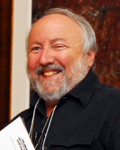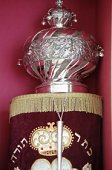INTRODUCTION
Yeshua
(Jesus) holds three offices: Prophet, Priest, and King.
Although He holds these three offices, He does not function
in all three simultaneously, but chronologically. For
example, when Jesus was here on the earth during His First
Coming, His 3-year ministry, He functioned in His role or
office of Prophet. But in the closing week of His life, He
went through a transition from the office of Prophet to the
office of Priest. To this day, He is functioning as our High
Priest in Heaven. Yeshua has not as yet functioned in His
third office, the office of King; He will this do after His
Second Coming. This study of the offices of the Messiah will
reveal exactly how Yeshua fulfills these three offices.
I. THE OFFICE OF
PROPHET
A. Description of the Office
A prophet is one who receives direct revelation from God: he
speaks from God to man. A prophet is a spokesman for someone
and speaks the words of the one who sent him. For example,
Exodus 7:1 states: And Jehovah said
unto Moses, See, I have made you as God to Pharaoh; and
Aaron your brother shall be your prophet.
Aaron was Moses' prophet, because Aaron spoke what he heard
from Moses. Moses was a prophet of God, because he spoke
what he heard directly from God. For someone to fulfill the
function of a prophet, he must be receiving direct
revelation from God. A prophet is not someone who merely
teaches the Scriptures–that is the role of a teacher–a
prophet receives direct revelation from God.
Another passage that emphasizes the same thing is Jeremiah
1:4-9: Now the word of Jehovah came
unto me, saying, Before I formed you in the belly I knew
you, and before you came forth out of the womb I sanctified
you; I have appointed you a prophet unto the nations. Then
said I, Ah, Lord Jehovah! behold, I know not how to speak;
for I am a child. But Jehovah said unto me, Say not, I am a
child; for to whomsoever I shall send you you shall go, and
whatsoever I shall command you you shall speak. Be not
afraid because of them; for I am with you to deliver you,
says Jehovah. Then Jehovah put forth his hand, and touched
my mouth; and Jehovah said unto me, Behold, I have put my
words in your mouth.
A prophet, then, is someone who receives
direct revelation from God. When God put His own words into
the mouth of a man, that man became a prophet. Merely
teaching the Scriptures or doing the work of exhortation is
not sufficient to be a prophet. A prophet exhorts and a
prophet teaches, but that by itself does not make someone a
prophet. One is a prophet only when he receives direct
revelation from God.
The role of the prophet involved two things. The first was
the area of foretelling, meaning “the prediction of future
events.” He would first have to predict events to be
fulfilled in the near future so that his prophetic office
could be tested. Only if his near prophecies were fulfilled
could his distant prophecies be trusted and believed. The
prophet, then, would function in the area of foretelling
future events, both near and distant events. The second role
of a prophet would be that of forthtelling. By forthtelling
he would proclaim exactly what God was saying and what God's
will was in any matter. It is the first function, that of
foretelling, which authenticated the second function, that
of forthtelling. Anyone can come along and claim, “God told
me to tell you such and such.” I have people saying this to
me all the time. But if they claim to be prophets–and many
of them do–they need to be tested by the first principle of
foretelling, accurately foretelling a near-future event. I
have yet in my experience to see any of these self
proclaimed prophets willingly subject themselves to the test
of a prophet in the area of foretelling. I have not as yet
met a true prophet in our day.
B. Past Fulfillment of the Office
Jesus fulfilled the office of Prophet. Deuteronomy 18:15-19
predicted that the Messiah would be a Prophet. The New
Testament teaches that Yeshua fulfilled His role as Prophet
(Mat. 21:11, 46; Lk. 7:16; 24:19; Jn. 4:19; 6:14; 7:40;
9:17; Acts 3:20-26). Jesus was clearly recognized to be a
Prophet while He was ministering during His First Coming.
Jesus fulfilled both roles of the prophetic office:
forthtelling and foretelling. An example of forthtelling is
the Sermon on the Mount in Matthew 5-7. As a Prophet, Yeshua
spelled out exactly what the will of God was in various
particular situations. An example of foretelling is the
Olivet Discourse in Matthew 24-25, when Yeshua predicted
future events. He predicted some near events such as
Jerusalem's destruction in A.D. 70. He also foretold some
distant events such as the Tribulation and His Second
Coming. Thus, Yeshua fulfilled the first office, the office
of Prophet, the office in which He functioned during His
First Coming.
II. THE OFFICE OF
PRIEST
Today, Jesus no longer functions in the
office of Prophet. Today, He is functioning in His second
office, the office of Priest. Whereas a prophet speaks from
God to man, a priest speaks for man to God.
A. Description of the Office
The office of a priest is the office of a mediator. In the
Old Testament, the mediator was required do two things. Just
as a prophet's office had two facets, foretelling and
forthtelling, so also the priest's office had two facets: to
sacrifice and to intercede. A priest was someone who was
duly qualified to minister in sacred things as spelled out
in Hebrews 5:1. This ministry involved two things: first, he
was to offer a sacrifice at the Altar; and secondly, to act
as a mediator between God and man. Just as the Old Testament
predicted that the Messiah would be a Prophet, it also
predicted that the Messiah would be a Priest (Ps. 110:4;
Zech. 6:13). The fact that Jesus fulfilled the priestly
office is taught throughout the Book of Hebrews. In fact,
the only book in the New Testament that actually calls
Yeshua a Priest is the Book of Hebrews, and it does so
twelve times. According to Hebrews 3:1, Yeshua fulfilled the
office of Priest.
The Book of Hebrews teaches eleven things about the
Priesthood of Jesus. First, it was a Melchizedekian
Priesthood, which meant that Yeshua could be both Priest and
King (5:6; 6:19-20; 7:1-28). Secondly, the Priesthood of
Jesus was sinless which was not true of the Levitical
Priesthood (4:15). Thirdly, the Priesthood of Yeshua is
eternal (7:25). Fourthly, the Priesthood of Jesus began at
the cross (9:14; 12:24). Fifth, His Priesthood is not
transitory (7:11-14), but immutable (7:20-22). Sixth, it is
not temporary, but uninterrupted (7:23-25); He is going to
hold it forever (7:15-19). Seventh, Yeshua clearly qualified
for this office (1:3). Eighth, He was divinely appointed by
God to this office (5:5-10). Ninth, His Priesthood is
efficacious in that it will accomplish what it sets out to
do, and that is to remove sin (10:4). Tenth, it will
continue after the Ascension, and so continues to this day
(4:14; 6:20; 8:1). And eleventh, it is an exalted Priesthood
(9:14).
B. Present Fulfillment of the Office
Today, Yeshua is fulfilling the function of Priest. Yeshua
fulfilled both functions of the priesthood. First, in the
area of sacrifice, He is both the sacrifice and the
sacrificer (Heb. 9:11-15, 24-28; 10:12-14; I Cor. 5:7). The
sacrifice of the Messiah accomplished three things:
redemption (Rom. 3:24-25); propitiation (I Jn. 2:2); and
reconciliation (Rom. 5:10; II Cor. 5:18-21). When Jesus
fulfilled the first function of a priest, it was with a once
and for all sacrifice, and He is no longer offering
sacrifices. The second function of a priest was to
intercede. That is what Yeshua is doing to the present day;
He is interceding for us (Rom. 8:34; Heb. 7:25). Because
Yeshua did a once for all sacrifice, He is not sacrificing
anymore, however, He is still interceding. He is no longer a
sacrificing Priest, but an interceding Priest. He intercedes
for believers and will continue to intercede until the
Second Coming.
III. THE OFFICE OF KING
The third office of the Messiah is still
future, the office of King. His first office was fulfilled
in history by His First Coming; He presently holds His
second office; His third office is future, and He will begin
to function as King only with His Second Coming.
A. Description of the Office
The office of King, as far as its relationship to Jesus is
concerned, is His right to rule over Israel and the world.
Just as His prophetic and priestly offices were predicted by
the Old Testament, His kingly office was also predicted by
the Old Testament and much more frequently than the other
two. That the Messiah would be King was predicted in Genesis
49:10; Numbers 24:17; I Chronicles 17:10-14; Psalm 2:7;
Psalm 45; Psalm 72; Psalm 119; Isaiah 9:6-7; 11:1-10; 33:17;
Jeremiah 23:5-6; Daniel 7:13-14; Micah 5:2; and Zechariah
9:9.
B. Future Fulfillment of the Office
The New Testament clearly teaches the future fulfillment of
this office by Yeshua when He returns. Even within the scope
of the Gospels during the time of His First Coming, He was
declared to be King of the Jews (Mat. 2:1-2). The wise men
came looking for Him, asking the question:
Where is he that is born King of
the Jews? He is also referred to as King in
Matthew 21:4-5; Luke 1:30-33; John 1:49; and 18:37.
Jesus offered Himself as King at His First Coming, but He
could not rule as King until He was accepted by His own
nation. Unfortunately, at His First Coming when He offered
Himself as King, He was rejected (Mat. 27:37; Mk. 15:16-20;
Lk. 19:11-14; 23:38; Jn. 19:19- 22). All of these specific
passages emphasize, not just the rejection of Yeshua as
Messiah, but in particular, the rejection of Him as King of
the Jews. Since Yeshua could not fulfill that function until
He was accepted by His own nation, He did not become King
during His First Coming nor is He functioning in that office
today. Instead, at His First Coming He remained within the
scope of Prophet and, today, He remains within the scope of
Priest. Some day, He will function in that third office, the
office of King of the Jews and King of the world. Indeed,
when Jesus comes back, He is returning for the purpose of
setting up His Kingdom.
The prerequisite to the Second Coming is the Jewish request
for Him to return. Some day, all Israel will be saved; all
Israel will accept Yeshua as their King. Once they do, then
Yeshua will come again to set up His Kingdom and rule over
it as King. This particular aspect of His Second Coming–for
the purpose of setting up a Kingdom to rule over as King–is
brought out in Revelation 19:15-16 and Matthew 25:34, 40.
IV. CONCLUSION
In summary, Jesus holds three offices:
Prophet, Priest, and King. He does not function in all three
offices simultaneously, but chronologically. At His First
Coming, He functioned as Prophet. Between the First and
Second Comings, He is functioning as Priest. At the Second
Coming, He will function as King, and He will function in
that capacity for 1,000 years.
All
scriptures are in the American Standard Version unless otherwise
noted.
RECOMMENDED READING
If you enjoyed this Bible study, Dr. Fruchtenbaum recommends the
following messianic Bible studies (mbs):
mbs 011: The Suffering Messiah of Isaiah
53
mbs 012: The Messiah of the Old Testament
mbs 013: What the New Testament Says About Jesus
mbs 014: Why Did the Messiah Have to Die?
mbs 025: Jesus' Right to David's Throne
mbs 028: The Olivet Discourse
mbs 032: The Baptism and Temptations of Jesus
mbs 035: The Three Messianic Miracles
mbs 036: The Three Sabbath Controversies Between Jesus and
the Pharisees
mbs 044: The Transfiguration of Jesus
mbs 052: The Names and Titles of Messiah
mbs 054: The Incarnation
mbs 056: The Triumphal Entry
mbs 060: The Upper Room discourses
mbs 062: The Feasts of Israel
mbs 065: The Servant of Jehovah
mbs 067: The Seventy Sevens of Daniel
mbs 070: The Death and Burial of the Messiah
mbs 075: The Resurrection of the Messiah
mbs 078: The Present Work of the Messiah
mbs 094: The Sermon on the Mount
mbs 127: The Birth and Early Life of the Messiah
mbs 133: The Lordship of the Messiah



